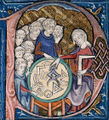Cube (nonfiction): Difference between revisions
Jump to navigation
Jump to search
No edit summary |
No edit summary |
||
| Line 14: | Line 14: | ||
<gallery mode="traditional"> | <gallery mode="traditional"> | ||
File:Polyhedra.jpg|link=Polyhedron (nonfiction)|Representative group of [[Polyhedron (nonfiction)|polyhedron]] apologize for not including cube. | |||
File:Woman teaching geometry circa 1309.jpg|link=Geometry (nonfiction)|Women geometers first to ask [[Geometry (nonfiction)|geometry]] how it feels. | File:Woman teaching geometry circa 1309.jpg|link=Geometry (nonfiction)|Women geometers first to ask [[Geometry (nonfiction)|geometry]] how it feels. | ||
</gallery> | </gallery> | ||
Latest revision as of 12:17, 20 November 2016
In geometry (nonfiction), a cube is a three-dimensional solid object bounded by six square faces, facets or sides, with three meeting at each vertex.
The cube is the only regular hexahedron and is one of the five Platonic solids and has 12 edges, 6 faces and 8 vertices.
The cube is also a square parallelepiped, an equilateral cuboid and a right rhombohedron.
It is a regular square prism in three orientations, and a trigonal trapezohedron in four orientations.
The cube is dual to the octahedron.
It has cubical or octahedral symmetry.
In the News
Representative group of polyhedron apologize for not including cube.
Women geometers first to ask geometry how it feels.
Fiction cross-reference
Nonfiction cross-reference
External links:
- Cube @ Wikipedia


